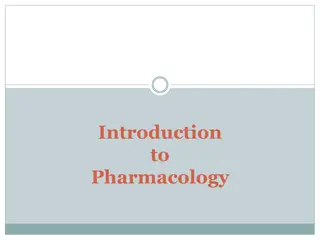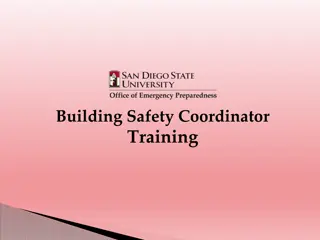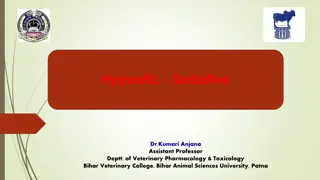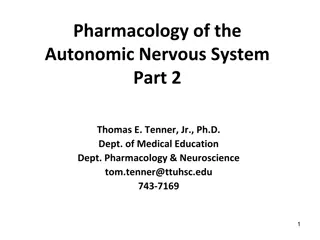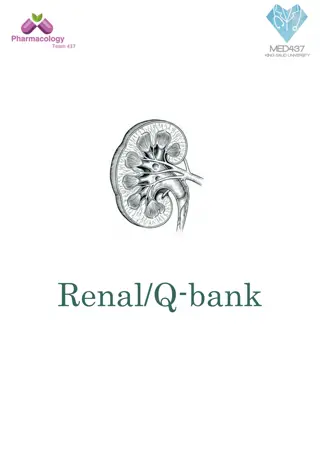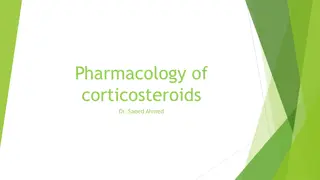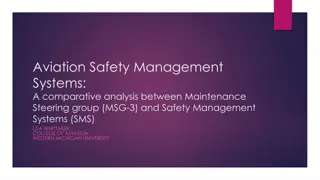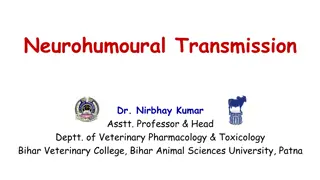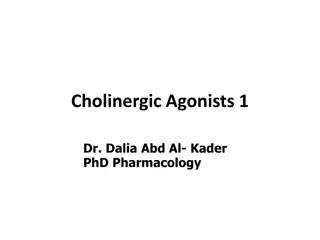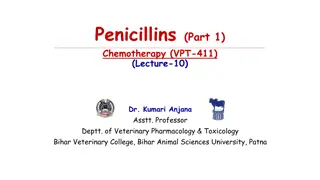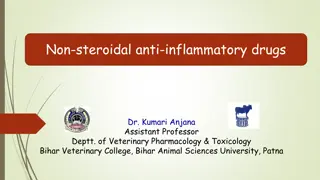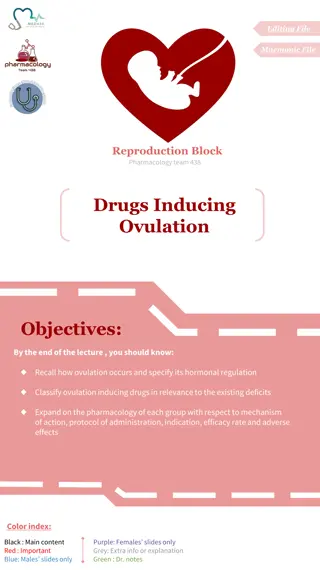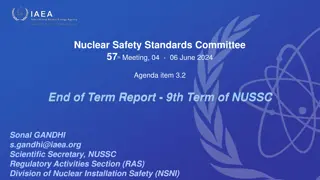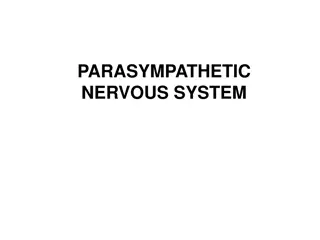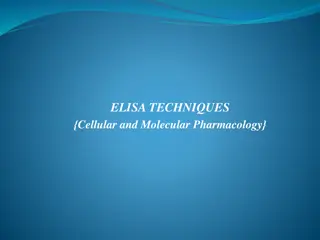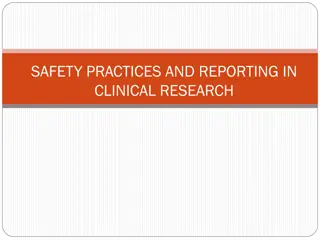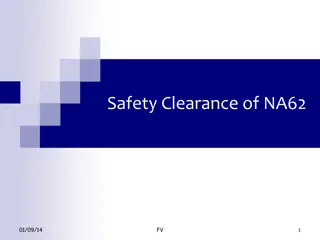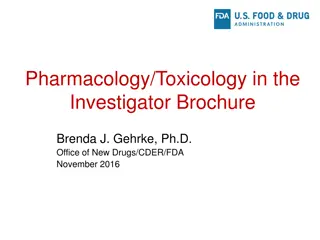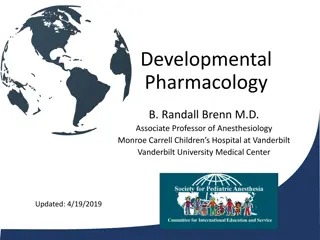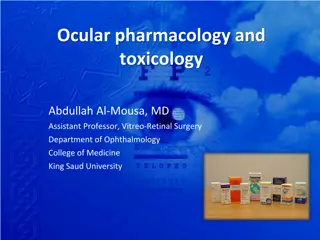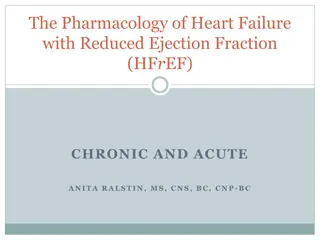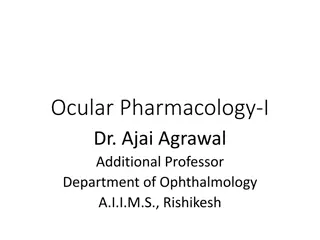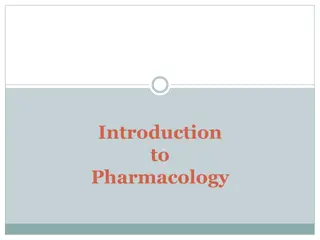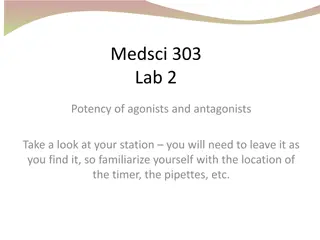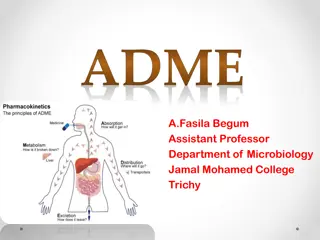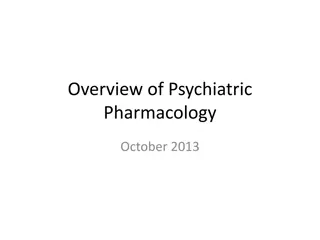FACILITY MANAGEMENT & SAFETY
Facility management and safety are interlinked disciplines crucial for optimizing workflow and ensuring a safe environment in various facilities. This includes managing space, infrastructure, resources, and staff effectively. Specific focus on laboratory facility management involves maintaining qual
3 views • 19 slides
Safety Health and Welfare.
The Campus Safety, Health, and Welfare (SHW) Committee at TU Dublin is vital for ensuring a safe and healthy environment for all members. Led by Edel Niland, the Senior Manager, the committee focuses on various aspects such as safety arrangements, committee structure, team organization, and safety t
3 views • 21 slides
Understanding Pharmacokinetics in Clinical Pharmacology
Pharmacokinetics, as explained in a lecture by Oula Mohammed Sami, M.B.Ch.B/MSc in clinical pharmacology, delves into how the body processes drugs, contrasting with pharmacodynamics which focuses on drug actions. Key topics covered include properties influencing treatment outcomes, the significance
5 views • 45 slides
Historical Development and Principles of Pharmacology
Explore the historical roots of pharmacology from ancient civilizations like India, China, and Egypt. Learn about the development and principles of drug activity, including pharmacokinetics and pharmacodynamics. Discover early medicinal practices and the evolution of drug administration. Gain insigh
1 views • 50 slides
Enhancing Safety: People Power SafetySTEP Refresher Training
Explore the comprehensive SafetySTEP Refresher Training program aimed at achieving safety through employee participation, engagement, and proactive safety measures. This training emphasizes creating a culture where safety is a core value, utilizing leading indicators to measure safety successes, and
0 views • 65 slides
Importance of Safety in Construction Business
Ensuring safety in construction projects is crucial for success. Safety measures should be integrated from the design phase to project completion. Key principles include having a dedicated safety department, considering safety records, allocating funds for safety management, providing safety educati
0 views • 64 slides
Comprehensive Building Safety and Emergency Preparedness Training
Enhance your safety preparedness with Building Safety Coordinator Training, Emergency Preparedness resources, Communication Resources, Fire Safety procedures, and Earthquake Safety measures. Learn about fire extinguisher use, fire response procedures, earthquake safety considerations, and the seven
1 views • 30 slides
Overview of Sedatives and Hypnotics in Veterinary Pharmacology
This chapter discusses the classification, salient features, and uses of sedatives and hypnotics in veterinary pharmacology. Sedatives subdue excitement and induce calmness without necessarily causing sleep, while hypnotics induce and maintain sleep. Both classes of drugs act as CNS depressants and
1 views • 23 slides
Pharmacology of the Autonomic Nervous System Part 2 Summary and Learning Objectives
Explore the pharmacology of the autonomic nervous system focusing on cholinergic and adrenergic agents. Learn about cholinomimetics, direct and indirect acting cholinergic agonists, their therapeutic indications, and adverse effects. Discover the mechanism of action and uses of nicotinic agonists. D
0 views • 44 slides
National Mine Safety Week 2023 - Vehicle Safety Guidelines
Explore the comprehensive safety guidelines for vehicle operation during National Mine Safety Week 2023. Learn about maintaining safety equipment, cabin safety systems, visibility safety systems, operational safety systems, emergency safety systems, other safety systems, training responsibilities, a
1 views • 10 slides
Renal Pharmacology: Drug Excretion and Renal Clearance Questions
This comprehensive set of questions and answers covers topics related to drug excretion and renal pharmacology. It includes information on glomerular filtration, drug excretion mechanisms, dosage adjustments in renal impairment, factors influencing drug excretion, and the effects of long-term NSAID
0 views • 55 slides
Overview of Cephalosporins in Veterinary Pharmacology
Cephalosporins are a group of semisynthetic antibiotics derived from cephalosporin C obtained from a fungus. This chapter covers the introduction, chemistry, properties, solubility, classification, spectrum of activity, mechanism of action, applications, and side effects of cephalosporins. They offe
2 views • 29 slides
Understanding Pharmacology of Corticosteroids by Dr. Saeed Ahmed
Corticosteroids are steroid hormones produced by the adrenal cortex, classified into glucocorticoids and mineralocorticoids. Glucocorticoids have diverse effects on metabolism, immune responses, and inflammation, whereas mineralocorticoids regulate electrolyte balance. Mechanistically, corticosteroi
1 views • 32 slides
Understanding Routes of Drug Administration in Fish Pharmacology
Fish pharmacology is crucial for treating fish diseases effectively using drugs. Factors like water quality, pathogens, mortality rate, legal aspects, and economics need consideration. Different routes of drug administration in fish include water medication, immersion or dipping, hyperosmotic infilt
1 views • 20 slides
Comparative Analysis of Aviation Safety Management Systems: MSG-3 vs. SMS
The aviation industry continuously strives to enhance safety, leading to the development of Safety Management Systems (SMS) by ICAO and the longstanding Maintenance Steering Group (MSG-3) program. These systems focus on improving safety through different approaches, with MSG-3 emphasizing engineerin
0 views • 25 slides
Understanding Neurohumoural Transmission in Veterinary Pharmacology
Neurohumoural transmission in the field of veterinary pharmacology involves the communication of nerve messages through the release of chemical messengers. This process includes axonal conduction and junctional transmission. The historical aspects of neurohumoural transmission highlight key discover
5 views • 11 slides
Understanding Cholinergic Neurons and Agonists in Pharmacology
Cholinergic neurons play a vital role in neurotransmission by utilizing acetylcholine (ACh) as a neurotransmitter. This neurotransmission involves steps like synthesis, storage in vesicles, release, receptor binding, degradation, and recycling of choline and acetate. Choline acetyltransferase cataly
0 views • 30 slides
Ensuring Contractor Safety in Higher Education: Key Practices and Guidelines
Highlighting the importance of contractor safety in higher education, this content emphasizes the need for effective safety planning, compliance with OSHA standards, and risk mitigation strategies. It discusses serious events in higher education related to contractor safety and provides insights on
0 views • 24 slides
History and Use of Penicillins in Veterinary Pharmacology
Penicillins, the first beta-lactam drugs discovered by Alexander Fleming, play a crucial role in combating bacterial infections. With a rich history dating back to 1928, these antibiotics revolutionized healthcare during World War II, significantly reducing mortality rates from infectious diseases.
0 views • 18 slides
Overview of Non-Steroidal Anti-Inflammatory Drugs (NSAIDs) in Veterinary Pharmacology
Non-steroidal anti-inflammatory drugs (NSAIDs) are a diverse group of medications with analgesic, anti-inflammatory, and antipyretic effects. They act primarily on peripheral pain mechanisms and have limited CNS effects. NSAIDs have a long history dating back to the use of White Willow bark, and the
0 views • 16 slides
Proactive Safety Measures: PDO Safety Stand Down April 2024
A Safety Stand Down is a crucial activity to proactively discuss safety with employees, emphasizing risk awareness and injury prevention. The incident involving a fatal injury during Rig Move activities serves as a catalyst for reflection and improvement regarding safety procedures. This guide provi
1 views • 4 slides
Understanding Respiratory System Pharmacology and Cough Physiology
The regulation of respiration involves sensory and efferent pathways, with afferent pathways comprising stretch receptors, C-fibres, and irritant receptors, while efferent pathways include parasympathetic and sympathetic nerves. Cough physiology is a protective reflex initiated by various stimuli to
2 views • 43 slides
Neutrino Platform Hall Access and Safety Guidelines
Guidelines for accessing and ensuring safety within the Neutrino Platform Hall at CERN, including registration, permissions, safety trainings, required equipment, online trainings, access points, and safety team responsibilities. Access is granted through registration at CERN, completion of safety t
1 views • 7 slides
Importance of Safety Education for Graduate and Undergraduate Students
Graduate and undergraduate students often lack safety knowledge and ethics, emphasizing the need for safety education over mere training. Safety education builds critical thinking, promotes safety ethics, and prepares individuals to handle future safety issues. Incorporating safety teachings through
1 views • 11 slides
Pharmacology of Ovulation-Inducing Drugs
Understanding the mechanism of ovulation and hormonal regulation is key in classifying drugs used to induce ovulation. This lecture covers the pharmacology of different groups of drugs, their mechanisms of action, administration protocols, indications, efficacy rates, and adverse effects. Antiestrog
0 views • 6 slides
NUSSC 57th Meeting - End of Term Report & Safety Standards Update
The 57th Meeting of the Nuclear Safety Standards Committee (NUSSC) concluded its 9th term with significant achievements including the approval and publication of multiple safety standards. Key highlights include the development of new standards such as SSG-3, SSG-88, SSG-89, and SSG-90 focusing on v
0 views • 8 slides
Understanding the Parasympathetic Nervous System and Cholinergic Pharmacology
Dive into the world of the parasympathetic nervous system and cholinergic pharmacology, exploring concepts like cholinomimetics, parasympathomimetics, cholinolytics, and more. Discover how acetylcholine synthesis and degradation play crucial roles in these processes, and learn about different cholin
0 views • 27 slides
Understanding ELISA Techniques in Cellular and Molecular Pharmacology
ELISA (Enzyme-Linked Immunosorbent Assay) is a vital immunological technique used in detecting antigens or antibodies in samples. This article covers the types of ELISA tests, such as Direct, Indirect, and Sandwich, along with the principles and applications of ELISA in diagnosis. The process involv
0 views • 18 slides
Safety Practices and Reporting in Clinical Research
Safety practices and reporting in clinical research are crucial for ensuring the rights, safety, and well-being of trial subjects. This includes monitoring safety, reporting adverse events promptly, and following regulatory requirements. Investigators play a vital role in assuring subject safety and
0 views • 33 slides
Safety Clearance Procedure for NA62: Overview and Recommendations
The conventional safety clearance procedure for NA62 involves checks by DGS-SEE (HSE) and obtaining radiological safety clearance from the DGS/RP group. Various safety checks are outlined in memorandums by Mark Hatch and Jonathan Gulley. Safety files for NA62 are noted to be in poor states, lacking
0 views • 8 slides
Student Perspectives on Learning Pathology and Pharmacology in Veterinary Medicine
Explore student experiences in learning tricky concepts in pathology and pharmacology as part of a veterinary medicine program. Discover challenges faced, valuable resources created, and the importance of student perspectives in enhancing learning outcomes.
0 views • 21 slides
Understanding Pharmacology and Toxicology in Investigator Brochures
Explore the essential aspects of pharmacology and toxicology covered in Investigator Brochures, including nonclinical information, safety pharmacology, general toxicology, genetic toxicology, and more. Learn about the significance of pharmacology in predicting intended and unintended effects, consid
1 views • 40 slides
Pediatric Pharmacology Considerations and Challenges
Developmental pharmacology in children involves unique considerations such as drug metabolism, urine concentration, and muscle relaxant dosing. The field faces challenges with limited drug testing in pediatric populations, emphasizing the importance of age-appropriate pharmacotherapy. Factors like d
0 views • 39 slides
Understanding Ocular Pharmacology: General Principles and Drug Delivery
The study of ocular pharmacology involves understanding general pharmacological principles, pharmacodynamics, and pharmacokinetics. Drugs can be delivered to ocular tissue locally via eye drops, ointments, injections, or systemically through oral or intravenous routes. Factors such as drug concentra
0 views • 58 slides
Pharmacology of Heart Failure with Reduced Ejection Fraction (HFrEF)
Understanding the pharmacology of heart failure with reduced ejection fraction is crucial as it impacts millions of Americans and poses significant healthcare costs. The complex pathophysiology involves mechanisms like the Frank-Starling mechanism, alterations in myocyte regeneration, neurohumoral s
0 views • 44 slides
Understanding Ocular Pharmacology - An Overview by Dr. Ajai Agrawal
Explore the intricate world of ocular pharmacology with Dr. Ajai Agrawal, an Additional Professor at A.I.I.M.S., Rishikesh. The learning objectives cover pharmacokinetics, pharmacodynamics, and various routes of drug administration in ocular treatments. Delve into the anatomy of the eye, tear film c
0 views • 51 slides
Exploring the Fascinating World of Pharmacology: From Historical Developments to Basic Principles
Uncover the rich history of pharmacology from ancient civilizations to modern times, tracing the origins of medicinal practices and the development of drug-related concepts. Delve into the fundamental areas of pharmacology, including pharmacokinetics and pharmacodynamics, to understand the mechanism
0 views • 50 slides
Pharmacology Lab Equipment and Safety Guidelines
Explore the setup and procedures of a Pharmacology lab focusing on agonists and antagonists potency testing. Learn about equipment, tissue suspension, lab safety, lab plan, and health precautions. Follow instructions for conducting experiments, recording data, and cleaning up. Utilize resources prov
0 views • 28 slides
Understanding ADME in Pharmacokinetics and Pharmacology
Pharmacokinetics and pharmacology, focused on ADME processes, play a crucial role in drug development and delivery. Absorption, distribution, metabolism, and excretion determine how drugs interact within the body. Absorption involves transfer into the bloodstream, while distribution entails the spre
0 views • 12 slides
Overview of Psychiatric Pharmacology: A Comprehensive Guide from 2013
This presentation delves into the nuances of psychiatric pharmacology, exploring common psychiatric conditions, historical perspectives on medical treatments, categories of psychiatric medications, and principles of treatment. It also touches on mental illness definitions from DSM-IV-TR and DSM-V, a
0 views • 27 slides



